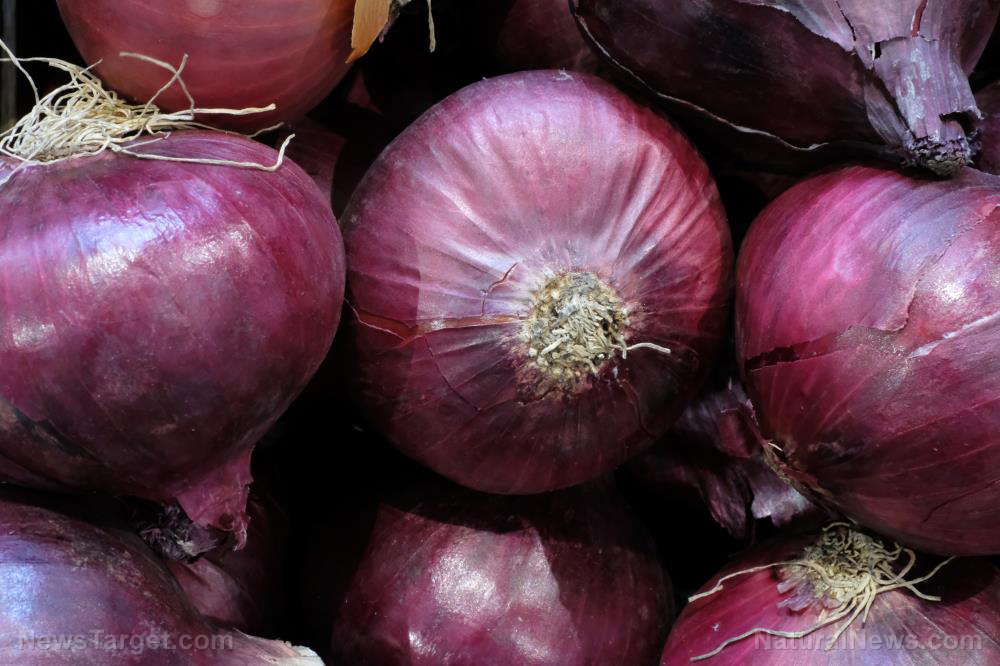Protect your colon with food: Garlic and onions reduce risk of colorectal cancer
07/07/2019 / By Melissa Smith

Garlic and onions are commonly used to flavor food – but they offer far more benefits than that. A recent study suggests that garlic, onions, and other Allium vegetables – leeks, chives, shallots – may prevent colorectal cancer.
Bioactive compounds in Allium vegetables were previously reported to prevent breast cancer and prostate cancer. In this study, which was published in the Asia-Pacific Journal of Clinical Oncology, researchers from The First Hospital of China Medical University in Shenyang, China, looked at whether consuming allium vegetables could lower a person’s risk of colorectal cancer.
To do so, they compared 833 participants diagnosed with colorectal cancer with 833 cancer-free individuals. Both groups were similar in age and sex and lived in similar locations. The researchers interviewed all participants about their demographics and recorded their dietary habits using a validated food frequency questionnaire.
The researchers discovered that people who consumed the most Allium vegetables had 79 percent lower colorectal cancer risk than those who consumed the least. They found that eating at least 35 lbs. of Allium vegetables per year could slash colorectal cancer risk. This would be around 1 ½ oz. – or one onion – every day.
“It is worth noting that in our research, there seems to be a trend: the greater the amount of allium vegetables, the better the protection,” said senior author Dr. Zhi Li.
Li also noted that cooking methods may affect the anticancer effect of the vegetables. Li explained that boiling onions, for example, would reduce their useful compounds, while slicing and crushing fresh garlic were beneficial. (Related: Eat your veggies: 6 allium vegetables and their health benefits.)

“In general, the present findings shed light on the primary prevention of colorectal cancer through lifestyle intervention, which deserves further in-depth explorations,” said Li.
More ways to prevent colorectal cancer
Colorectal cancer, or colon cancer, develops in the colon or rectum. In the U.S., colorectal cancer is the second leading cause of death by cancer and the third most common cancer in both men and women. Despite the high rates, this form of cancer is highly preventable. In addition to eating onions and garlic, here are six more ways to increase your protection against colorectal cancer:
- Get screened – Getting regular screening tests for colon cancer can prevent the disease by finding abnormal growths called polyps in the colon or rectum that can be removed before they turn into cancer. It also helps detect the disease early, when it is most treatable. The American Cancer Society recommends getting screened starting at age 45 for people at average risk.
- Eat more fruits, vegetables, whole grains – Diets that incorporate plenty of vegetables, fruits, and whole grains are associated with a lower risk of colorectal cancer. Conversely, eating less of these and more red and processed meats increases the cancer risk.
- Be physically active – A sedentary lifestyle can increase your chance of developing colorectal cancer and other diseases, so it’s best to start moving around and being more physically active to reduce your risk.
- Maintain a healthy weight – Excess weight increases your risk of developing and dying from colorectal cancer. To maintain a healthy weight, eat healthier and exercise regularly.
- Stop smoking/Don’t smoke – Quitting this habit will save you from tons of health risks. On top of increasing your risk of serious health problems like heart disease, stroke, and emphysema, smoking is a major cause of at least 14 types of cancer, including colorectal cancer.
- Limit your alcohol intake – Drinking too much alcohol is shown to increase colorectal cancer, on top of other health problems. Alcohol intake should be limited to one drink per day for women and no more than two drinks a day for men.
Making these lifestyle changes can be hard, but they can greatly lower your risk for colorectal cancer and many other types of cancer, as well as other serious health problems like diabetes and heart disease.
Sources include:
Submit a correction >>
Tagged Under:
allium, alternative medicine, anticancer, chives, colon cancer, Colorectal Cancer, disease treatments, food cures, food is medicine, functional food, garlic, Herbs, Leeks, natural cures, natural medicine, onion, prevention, research, shallots, vegetables, veggie
This article may contain statements that reflect the opinion of the author





















